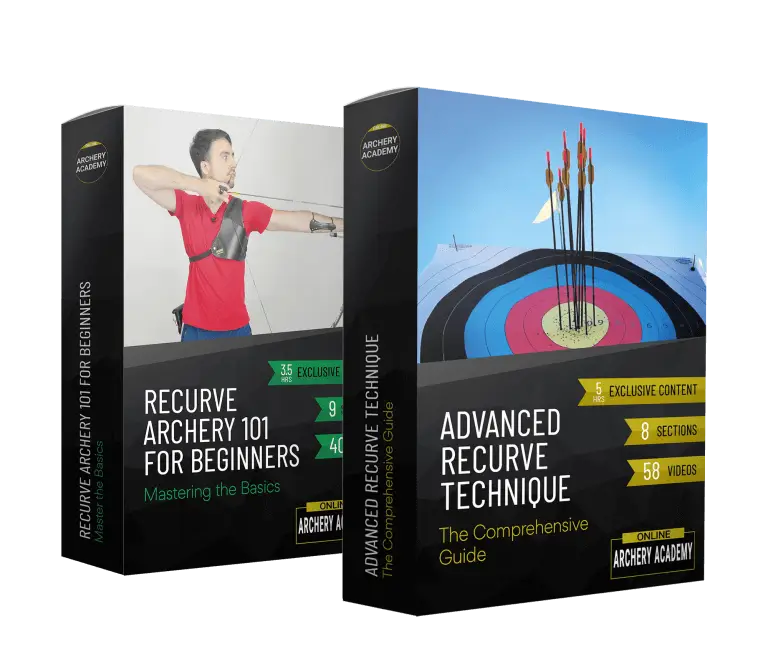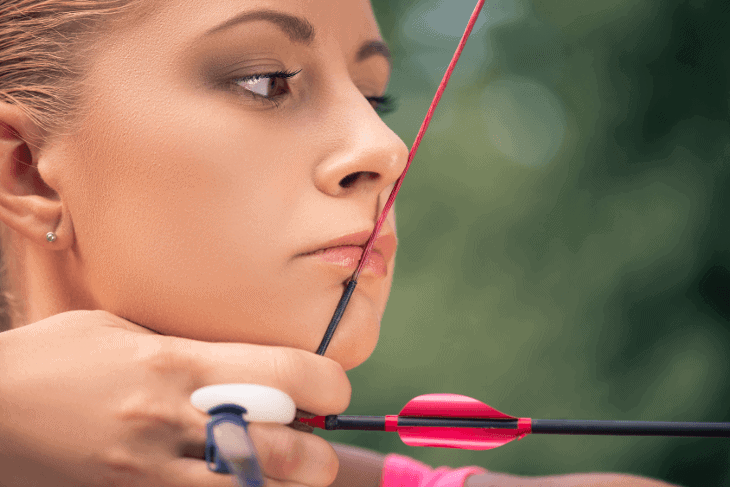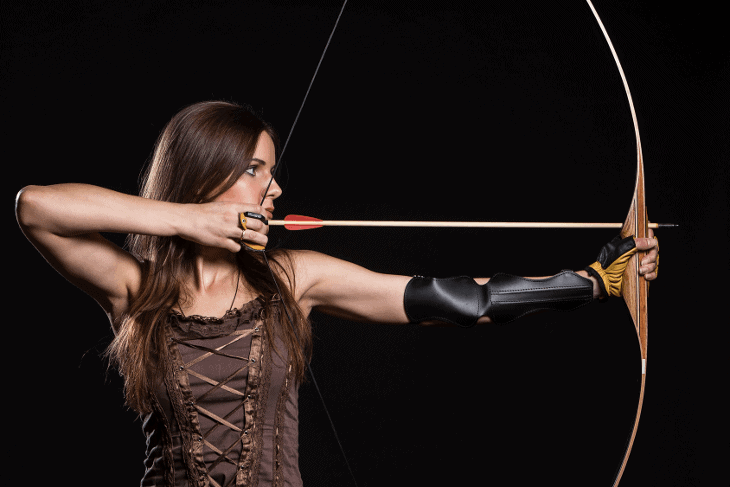One of the aspects of archery I love most is that it’s one of those sports where you can take what you’ve learned, and apply it to the rest of your life. There are so many valuable life lessons you glean from archery, and so many ways to apply those lessons, that the activity itself is almost worth it for metaphorical value alone.
And not every sport allows for life lessons. Car racing, for example, has fewer life lessons, and they’re harder to apply—”Stay in your lane,” maybe? Or “When in danger, pump the brakes”? or simply “If you’re not first, you’re last,” from the immortal Ricky Bobby?
Either way, archery is fertile ground for existential insights. Here are a few things I’ve learned.

Practice Makes Perfect
This one sounds pretty intuitive—that constant, repetitive practice makes you better at something—and most people know figure it out on their own. If you want to improve, you put in the time.
When I started out in archery, all those years ago, I was… OK. Less than OK, actually! I was terrible. On my first outing, I don’t think I hit the target even once. I was absolutely horrible.
But for whatever reason, I absolutely loved it, and I hung in there. I kept going to the range, I keep shooting, and slowly I started to improve. And then, after a while, I *really* started to improve, to the point now where I’m a little amazed at how far I’ve come.
So while it may sound basic—”practice makes perfect”—I’m constantly blown away by it, because it’s true. By simply putting in the time, I can become more capable, more adept, more powerful—and that’s true for whatever I choose to practice.
When I think about that, it’s so incredibly hopeful! There are so many ways to improve, and all it takes is simple effort! We can become better, more capable people, just by trying. Isn’t that wonderful?
It seems simple, but I find it inspiring. If I keep practicing, I’ll keep better. It’s a great deal, if you think about it!
Character Matters More Than Gear
As an archer, I have to admit: I’m always a little bit jealous whenever someone walks into the range with a brand-new shiny bow. Once you’re “in the game” for a little bit, you know all the manufacturers of archery equipment, you know the different bow lines, and… you know how much each one of them costs!
But you know what? Over and over again, I’ve seen those guys, the ones with the $1,000+ bows, brick shot after shot—and then give up entirely. If I had a dollar for every time someone walked in with top-notch gear, made a big show of things, and then didn’t come back, well… I’d probably have enough for a shiny new bow!
The bottom line is that gear is secondary to all the things that matter—skill development, patience, perseverance, and most of all, HEART.
OK, Gear Matters a Little Bit
That last thing I wrote…
“The bottom line is that gear is secondary to all the things that matter—skill development, patience, perseverance, and most of all, HEART.”
That was pretty motivating, wasn’t it? Well, now I’m going to walk it back a little bit. Ha!
Once you’ve proven that you can develop your skills, increase your patience, persevere in the face of disappointment, and use your HEART… well, a good bow and a good arrow can make a lot of difference!
I’m a bit… let’s say, “frugal…” by nature, and I don’t like buying things if I don’t need to. So I held on to one of my beginner bows for years, until finally the guy at the pro shop took me aside and said, “Listen. I get it. You’re not a spender. But you’re here three times a week and you’ve become a really capable archer. You owe it to yourself to upgrade.” I thought that was a pretty good sales pitch, so I bought a new bow. And…
I have to admit, it made a pretty big difference. My accuracy increased dramatically, my shot cycle was a lot cleaner, and—to my surprise—I had less body soreness after longer practice sessions.
So, perhaps the life lesson here is “Skill development, patience, perseverance, HEART… and then a shopping spree.”
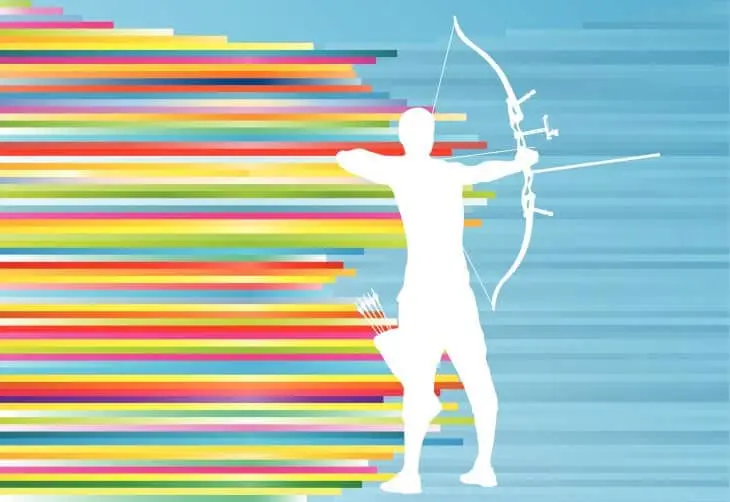
Achievers Document Their Actions
I’m not crazy about this one, but I think it’s true: in order to get better at something, you have to know how you’re performing, so you can track your progress—and make sure you are, in fact, making progress to begin with. To know how you’re performing, you have to take notes.
I don’t usually go for motivational books, because they get me all excited and then I don’t do anything I’ve learned from the book, but I recently read a book titled The Compound Effect by James Hardy (affiliate link), and one of the passages actually helped me a lot.
The book talked about how all-star athletes take meticulous notes about their successes and their failures. They document everything they do, so that they can 1) see whether or not their practice is causing them to improve, and 2) know what to do in certain situations.
That second one seemed interesting to me, so I started taking detailed notes on my practice. Not only did I find that I was, in fact, improving, but I found that I’m more accurate at certain times during my practice (usually 45 minutes into a session), and that I’m more successful in certain situations (I learned that I score better when I get a bullseye early, because I feel more confident, and my shots afterward are more accurate). I used this knowledge to do 45 minutes of shooting before I enter a tournament, and I’ve had a lot more success because of it.
I struggle with this one, to be honest, because I don’t love taking notes—but it seems to work, so I’m doing it, and I’m actually expanding it to other areas of my life, to see how I perform there, as well.
Peace of Mind is Priceless
I’m getting on in years, and I can’t tell you with certain clarity: your state of mind is more important than your circumstances. I’ve been on vacations in front of the beach and been miserable, and yet I’ve been on line at the Department of Motor Vehicles and been delighted by a great conversation I’ve had with a stranger. Your state of mind—your thoughts, your feelings, and your emotions—matter more than your circumstances, and one of the ways I’ve learned to control my thoughts and feelings is through meditation.
Meditation can bring a lot of peace, and there’s a lot of scientific evidence that proves that to be the case. A simple mindfulness meditation can help you dismiss thoughts that don’t serve you, relax and enjoy your surroundings, and feel more at peace with your life.
You can take the principles of mindfulness meditation and apply them to your archery practice—you can “be here now” during your practice sessions, breath peacefully and deeply, and let all those thoughts that don’t serve you pass by. Whenever I do that on the range, I’m always amazed at how peaceful I feel.
Meditation is a little intimidating for some people—they either think it’s too mystical, or religious in a way they don’t want to be religious, or simply too wishy-washy. If that describes your understanding of it, I’d urge you to give it a shot. It’s simply a mental practice, that can bring you a lot of peace.
Focus on the Here and Now
I’m going to stick on this topic for a moment, because I think it’s important. A moment ago I used the phrase “Be here now,” and while it seems a little hippie-ish, it represents a much higher truth: all we have is the present moment. That’s it.
And when you’re at full draw, with your archery target 10, 20, 30, even 70 yards in front of you—all you have is the here and now! Focusing on anything but the here and now will hurt your performance, so learning how to “be here now” is actually a vitally important archery skill.
And that’s wonderful, if you think about it. Archers get to practice being here now, because it’s a part of our sport. Other athletes—football players, runners, fighters—they don’t need to make that decision to “be here now.” They’re forced to. A boxer isn’t going to say, “I’m going to try to be in the moment”—he’s forced to be in the moment, because he’s getting punched in the face. We get to practice being in the moment, and that’s a powerful gift and an incredible opportunity for growth.
I’ve wasted a lot of time in my life I’m regretting something I did in the past, or daydreaming about some weird fantasy that’ll never happen, and for what? I can make plans for the future, but all I really have is the present. Archery reminds me that to enjoy being here now, and to get the most out of it.
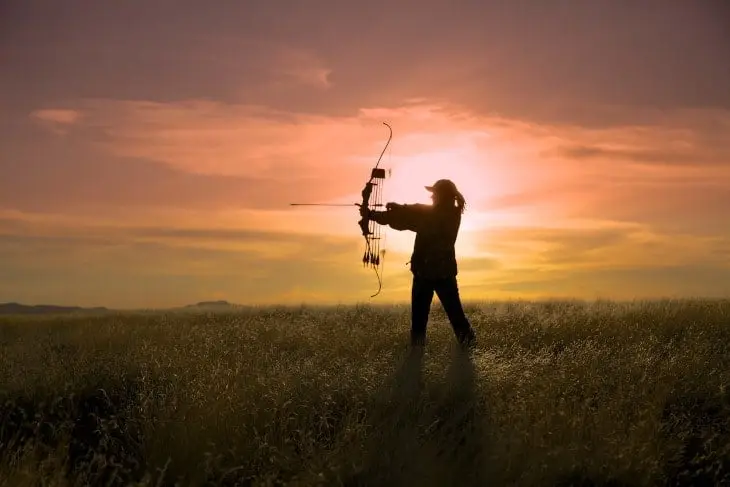
You Perform Better After Settling In
Remember before, when I talked about The Compound Effect, and taking notes about my performance? I mentioned how I started to perform better at about 45 minutes into a practice session.
It’s no coincidence that that moment—about 45 minutes into a practice session—is when I begin to feel fully relaxed and peaceful. It’s a reminder to me that I need to be patient, and that if I’m shooting poorly at first, all I need to do put that frustrating aside and keep at it, and I’ll likely improve.
And that leads me to my next life lesson…
There is Strength in Slowness
Ever notice how frantic life has gotten? We’re constantly moving from one thing to the next. Schedules, plans, pinging phones, Facetime/Skype/Zoom calls, video games, YouTube, a million show options on Netflix, Instagram, FaceBook, etc. It’s exhausting, honestly, and yet when we experience a single moment of boredom, we reach for our phones to distract us. It’s absurdly hectic, and yet without some insight to it all, that’s how we live our lives—all of us, at all ages.
It makes you think that speed is an all-important virtue. That in order to be successful or fulfilled, you need to maintain a frantic, frenetic pace that’s just about impossible to keep up.
Archery is literally the opposite of that.
In fact, to succeed and thrive in archery, you need to slow down. Way down. You need to put the phone aside—at least for a moment—and shut all that out. You need to take control of your time and your mind and your focus, and slow… it… down.
By slowing it down, you begin to realize the surprising power in approaching things more calmly. You realize that you simply won’t find success until you take things at a slower pace. In fact, you realize that the entirety of your success as an archer relies on slowing things down, and that once you’ve slowed things down, you can notice your posture, your breathing, and your focus, and a million other things.
Whenever I slough off that quickness of life and shoot a few ends, I always come away wondering, “What am I speeding past in the rest of my life? What am I not noticing, because I’m zipping from thing to thing, from distraction to distraction?” Whenever I ponder that, I usually find some new way to slow down and enjoy my life more.
Success Walks Hand-in-Hand with Failure
This isn’t really that original—it’s been said millions of times before, and you’ve probably heard it a million times before—but it’s worth repeating:
In order to succeed, you need to fail.
It’s just a fact. Failure is an integral part of the equation, a baked-in ingredient to the recipe of success. It is what it is.
The sad fact is, even when people know this, they tend to forget it and quit, because failure hurts. It really hurts! It hurts so bad that a lot of people give up when they experience it.
So that’s my take-away: to remember that failure is part of success, that it hurts, and that success is learning to deal with failure and get past it.
I’m still figuring that one out, so I’ll report back when I learn more 😉
Follow Your Passions, If You Can, and When You Can
Although I’ve learned plenty else from years of practice, this post is getting a little bit long, and I’ll close out with this one: do what you love.
Life is too difficult, with too many responsibilities and distractions, to waste any time. If you find something you like to do, do it as much as you can. Not to be glum, but the clock is ticking for all of us, and the sooner we realize it, the better. Find something you love, and do it as much as you can.
For many of us, though, following a passion is really difficult. We have school, work, kids, and so on—all good things, but things that keep us from doing those activities that we love. There are always a thousand reasons why today isn’t a great to do what you love, but… if not today, then when?
So if you can, make your passions a priority. Figure out what it is you love, and dive in.
For me, that passion is archery, and it’s why we’re building this site!
I hope something above strikes a chord with you, and we’d love to hear what you’ve learned from archery—hop over to our “Contact” page and drop us a line!

